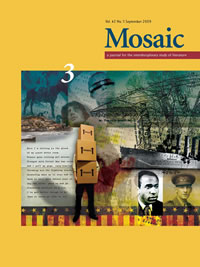Issue 42.3
Overview

General Issue
Published: September 2009
View the issue introduction or see the issue summary and contents below.
11 essays, totalling 192 pages
$19.95 CAD
This general issue includes eleven essays, at least four of which deal with “nature” (ecology, eco-poetics) as a prominent theme, approached in two cases through “trees”: through human/arboreal relations and through gendered “tree-scapes” in the art of Emily Carr and Judith Wright. Gender, another concern in the issue, is explored through the masculinities of V.S. Naipaul’s male protagonists. Other questions taken up in this issue include the link between art and community, the problem of remembering in the absence of eyewitness accounts, and aesthetic modes of resistance to colonialism, militarism, and capitalist commodity fetishism.
“Heard gripe hruson” (The hard grip of the earth): Ecopoetry and the Anglo-Saxon ElegyMatt Low Medieval studies could do more to embrace the growing theoretical field of ecocriticism. Simultaneously, current studies of nature poetry—or “ecopoetry”—have done little to look back to the roots of the language for early expressions of environmental sentiment. This essay seeks to reconcile these deficiencies by examining three Anglo-Saxon elegies from an ecocritical perspective. | |
On the Waldport Fine Arts Project and the Aesthetics of Estranged BeingTodd F. Tietchen This essay takes an important step toward recovering the aesthetic philosophies of the Waldport Fine Arts Project, an interned collective of World War II conscientious objectors whose ethos of “estranged being” foreshadowed the political concerns of the New Left, the post-war return to abstraction in the visual arts, and the autobiographical poetics of the Beat generation and confessional poets. | |
Telling Trees: Eucalyptus, “Anon,” and the Growth of Co-evolutionary HistoriesShelley Saguaro A new poetics is evident in a developing genre named here as “co-evolutionary histories.” This essay considers the relation of oral and written traditions to landscape and trees with reference to Murray Bail’s novel Eucalyptus and Virginia Woolf’s “Anon.” | |
Commodity Fetishism, Patriarchal Repression, and Psychic Deprivation in Arundhati Roy’s The God of Small ThingsJohn Lutz This essay considers the depiction of economic exploitation and patriarchal repression in The God of Small Things, a novel in which commodities serve as the obsessive focus of characters whose subordination to the system of commodity production and exchange has inspired in them a desire for mastery and control. Yet, the essay suggests, it is through characters victimized by the social order that the novel explores potential sites of resistance to capitalist exploitation and patriarchal domination. | |
Gendered Tree-scapes in the Art of Emily Carr and Judith WrightAnne Collett and Dorothy Jones This essay explores the impact of gender, colonial inheritance, and European modernism upon the representation of landscape in general, and trees in particular, in the work of two female artists who achieved iconic national status in the twentieth century: Canadian painter Emily Carr and Australian poet Judith Wright. | |
On Reality and Virtuality: A Study of Time Spaces in Plowing the DarkBradley Smith With virtual technologies becoming more commonplace in American culture, people think of virtual spaces as being disembodied spaces—spaces of the mind. In his novel Plowing the Dark, Richard Powers transgresses the boundary between reality and virtuality, calling into question the Cartesian principles on which the boundary is founded. | |
The Destabilization of Masculinity in A House for Mr. Biswas and The Mimic MenSteph Ceraso and Patricia Connolly V.S. Naipaul’s A House for Mr. Biswas and The Mimic Men expose conflicting and contradictory performances of masculinities in a colonized, creolized culture. Focusing on Naipaul’s male protagonists, we argue that the complex interconnections between gender performance, nationalism, race, class, and ethnicity destabilize Indo-Caribbean masculinities and exacerbate power imbalances at a personal and cultural level. | |
Frantz Fanon: Travelling Psychoanalysis and Colonial AlgeriaZiad Bentahar Although Frantz Fanon’s writings were intimately tied to colonial Algeria, his reflections have found resonance among a wide variety of audiences because of their theoretical and ideological value. Possibly, Fanon’s limited proximity to Algerian culture and society contributed to the relevance of his writings elsewhere. This essay argues that, in spite of Fanon’s involvement in the struggle for Algerian independence, his position in North Africa remained that of an outsider. | |
Art and Community in William Gaddis’s The RecognitionsBirger Vanwesenbeeck This essay distinguishes William Gaddis’s conception of art and community from that of his Romantic and modernist peers at the same time as it looks beyond the apologetic, elegiac, and satirical models through which critics have traditionally approached his work. | |
Vice President Lyndon Johnson: Stepping up to the BattlefieldJamie Thornton When the Kennedy/Johnson ticket won the executive branch in 1960, Lyndon Johnson needed to make the Vice Presidency viable. Johnson’s delivery of a speech on Memorial Day in 1963 on the former battlefield of Gettysburg shows how he achieved this goal. | |
Regenerating Wilfred Owen: Pat Barker’s RevisionsKaley Joyes In addition to writing Wilfred Owen’s persona and poems into her novel, Barker reworks two of his poems without identifying her source. Though these narrative strategies rely on Owen’s eyewitness perspective and canonical status, Barker’s revisions destabilize the authority of direct experience by emphasizing the accessibility of text. |